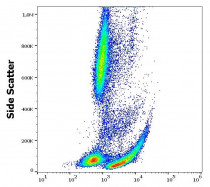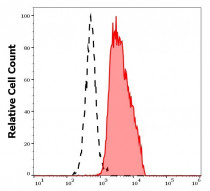ARG62917
anti-CD69 antibody [FN50] (FITC)
anti-CD69 antibody [FN50] (FITC) for Flow cytometry and Human
Developmental Biology antibody; Immune System antibody
Overview
| Product Description | FITC-conjugated Mouse Monoclonal antibody [FN50] recognizes CD69 |
|---|---|
| Tested Reactivity | Hu |
| Tested Application | FACS |
| Specificity | The clone FN50 recognizes CD69, an lymphocyte early activation marker. HLDA IV; WS Code A 91 |
| Host | Mouse |
| Clonality | Monoclonal |
| Clone | FN50 |
| Isotype | IgG1 |
| Target Name | CD69 |
| Antigen Species | Human |
| Immunogen | anti-µ-stimulated human B lymphocytes |
| Conjugation | FITC |
| Alternate Names | GP32/28; Activation inducer molecule; MLR-3; BL-AC/P26; Leukocyte surface antigen Leu-23; AIM; Early activation antigen CD69; Early T-cell activation antigen p60; EA1; CD antigen CD69; CLEC2C; C-type lectin domain family 2 member C |
Application Instructions
| Application Suggestion |
|
||||
|---|---|---|---|---|---|
| Application Note | * The dilutions indicate recommended starting dilutions and the optimal dilutions or concentrations should be determined by the scientist. |
Properties
| Form | Liquid |
|---|---|
| Purification Note | The purified antibody is conjugated with Fluorescein isothiocyanate (FITC) under optimum conditions. The reagent is free of unconjugated FITC and adjusted for direct use. No reconstitution is necessary. |
| Buffer | PBS, 15 mM Sodium azide and 0.2% (w/v) high-grade protease free BSA |
| Preservative | 15 mM Sodium azide |
| Stabilizer | 0.2% (w/v) high-grade protease free BSA |
| Storage Instruction | Aliquot and store in the dark at 2-8°C. Keep protected from prolonged exposure to light. Avoid repeated freeze/thaw cycles. Suggest spin the vial prior to opening. The antibody solution should be gently mixed before use. |
| Note | For laboratory research only, not for drug, diagnostic or other use. |
Bioinformation
| Database Links | |
|---|---|
| Gene Symbol | CD69 |
| Gene Full Name | CD69 molecule |
| Background | CD69 (C-type lectin domain family 2 C, CLEC2C, also known as AIM) is one of the earliest inducible cell surface molecules acquired during leukocyte activation. This glycoprotein serves as a lectin-type receptor in lymphocytes, NK cells and platelets; it is involved in lymphocyte proliferation. CD69 expression is counteracted on T cells in the AIDS stage of HIV infection, and may be also predictive for clinical response to chemoimmunotherapy. |
| Function | Involved in lymphocyte proliferation and functions as a signal transmitting receptor in lymphocytes, natural killer (NK) cells, and platelets. [UniProt] |
| Research Area | Developmental Biology antibody; Immune System antibody |
| Calculated MW | 23 kDa |
| PTM | Constitutive Ser/Thr phosphorylation in both mature thymocytes and activated T-lymphocytes. |
Images (2) Click the Picture to Zoom In
-
ARG62917 anti-CD69 antibody [FN50] (FITC) FACS image
Flow Cytometry: Human peripheral whole blood stained with ARG62917 anti-CD69 antibody [FN50] (FITC) (20 µl reagent / 100 µl of peripheral whole blood).
-
ARG62917 anti-CD69 antibody [FN50] (FITC) FACS image
Flow Cytometry: Separation of human thrombocytes (red-filled) from CD69 negative lymphocytes (black-dashed). Human peripheral whole blood stained with ARG62917 anti-CD69 antibody [FN50] (FITC) (20 µl reagent / 100 µl of peripheral whole blood).









